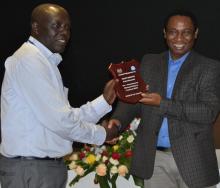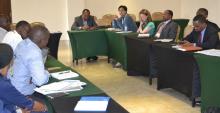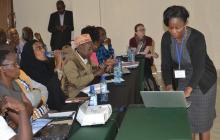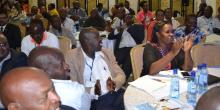Immunization Forum promises greater collaboration between counties and national government
An intergovernmental immunization forum ended in Machakos, Kenya last week with a great promise for collaboration between the national health ministry and counties and with the support from partners.
The two-day meeting brought together about 200 health personnel from all 47 counties, the national office and partners who included WHO, UNICEF, Clinton Foundation, Maternal and Child Health Integrated Program (MCHIP), Health NGO’s Network (Hennet), Population Services Kenya, Kenya Aids NGOs Consortium, (KANCO) and others.
The discussions revolved around immunization planning, challenges in administration and financing of immunization, barriers to immunization, roles and responsibilities of the national and county governments in health and coverage and performance of immunization.
The conversations evidently demonstrated a high level of willingness to engage openly, to share challenges and lessons learnt in the different contexts and a renewed need for collaboration between national and counties for solutions.
The health teams have in the past three years experienced thorny issues in managing and sustaining immunization and health after the country devolved health following a new constitution which necessitated that county governments take responsibility for their health affairs. The transition from managing health at national level to counties has led to limited financial support and political will from within county governments, lack of clarity of roles between national and counties, inadequate service delivery, among others.
These challenges also led to various issues including data inconsistencies, untrained immunization service providers, inconsistent supply of commodities, minimal supervision, minimal M&E systems, inadequate budgets for immunization activities, low facility/catchment population ratio, frequent breakdown of Cold Chain Equipment, lack of backup energy, geographical barriers with limited outreach services, sociocultural influences and weak community participation.
Speaking at the Forum, Health Cabinet Secretary Dr Cleopa Maillu acknowledged the challenges and efforts being made by the country to sustain immunization. But he also outlined the need for improvement.
“Let us critically re-examine and interrogate our immunization performance, with a view to improving our immunization coverage that has stagnated at around 80% over the last few years,” Dr Cleopa Maillu told the participants.
He said every year, 400,000 children out of the 1.5 million that are born in the county, do not receive lifesaving vaccines.
“Let us mobilize our communities to utilize available immunization services that the Government continues to offer free of charge. It is a shared responsibility so let us join hands in protecting our children from vaccine preventable diseases,” he added.
Dr Jackson Kioko, Director of Medical Services, called on partners to support the county find the best way of driving immunization to a successful level while some participants called for joint plans between the national and county governments to ensure efficiency in budgeting and harmony in activities.
“We need constant consultations so that we are clear about what aspects of health (and to what extent) are being handled by the national government and what is to be done by counties, “ Dr Jack Magara of Nyamira county said.
The teams outlined on various strategic commitments to help improve immunization. These include:
- Sharing of immunization score card quarterly by the national level
- Publishing county immunization performance in newspapers bi-annually
- Annual national and County forums to review progress on agreed action items (County and national leadership)
- Prioritize immunization services as a high impact-low cost intervention
- Advocacy to increase visibility and support for immunization by Governors and county assembly
- Improve data quality and use to inform immunization programming
- National program to negotiate with Kenya Medical Supplies Authority, Kemsa, to stock immunization devices and enable access by counties to sustain immunization services
- Counties to allocate funds for WHO prequalified cold chain equipment procurement
- Counties to forecast, plan, budget and track immunization expenditure with support from the national
- County managers to strengthen ACSM activities, community engagement and linkage to health services.
- National government to support documentation of advocacy and communication activities
These efforts will be complemented by a GAVI grant for supporting Health System Strengthening which will be implemented in the next five years. The grant is expected to deliver better immunization outcomes, including coverage and equity in a sustainable manner, through addressing system bottlenecks.
“To my ministry and my county colleagues, I do expect that this will act as catalytic funding that will spur further investments in Immunization service delivery,” Dr Maillu added.
Dr Collins Tabu, head of the National Vaccination and Immunization Programme, NVIP, called for accountability and responsibility adding: “we are held to account for whatever we receive, so we shall be expected to give our contribution to match what we get”.
The grant will benefit the whole country but also be used in focused counties with especially low coverage and unimmunized children.
____________________________________
For more information, please contact:
Jemimah W Mwakisha, Communications & Social Mobilisation, Tel: +254 722509403, Cell: +254 710 149489, Email: mwakishaj [at] who.int




